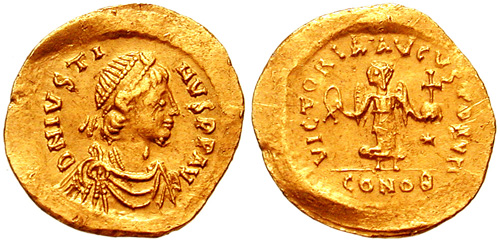|
Excubitores
The Excubitors ( la, excubitores or , , i.e. 'sentinels'; transcribed into Greek as , ) were founded in as an imperial guard unit by the Byzantine emperor Leo I the Thracian. The 300-strong force, originally recruited from among the warlike mountain tribe of the Isaurians, replaced the older as the main imperial bodyguard. The Excubitors remained an active military unit for the next two centuries, although, as imperial bodyguards, they did not often go on campaign. Their commander, the count of the Excubitors (, ), soon acquired great influence. Justin I was able to use this position to rise to the throne in 518, and henceforth the counts of the Excubitors were among the main political power-holders of their day; two more, Tiberius II Constantine and Maurice, rose to become emperors in the late 6th century. In the late 7th century, the Excubitors appear to have degenerated into a parade-ground formation, and fade from the record as a corps. Individual seals of office attest to ... [...More Info...] [...Related Items...] OR: [Wikipedia] [Google] [Baidu] |
Byzantine Empire
The Byzantine Empire, also referred to as the Eastern Roman Empire or Byzantium, was the continuation of the Roman Empire primarily in its eastern provinces during Late Antiquity and the Middle Ages, when its capital city was Constantinople. It survived the fragmentation and fall of the Western Roman Empire in the 5th century AD and continued to exist for an additional thousand years until the fall of Constantinople to the Ottoman Empire in 1453. During most of its existence, the empire remained the most powerful economic, cultural, and military force in Europe. The terms "Byzantine Empire" and "Eastern Roman Empire" were coined after the end of the realm; its citizens continued to refer to their empire as the Roman Empire, and to themselves as Romans—a term which Greeks continued to use for themselves into Ottoman times. Although the Roman state continued and its traditions were maintained, modern historians prefer to differentiate the Byzantine Empire from Ancient Rome ... [...More Info...] [...Related Items...] OR: [Wikipedia] [Google] [Baidu] |
Marcellus (comes Excubitorum)
Marcellus ( el, Μάρκελλος) was an East Roman (Byzantine) judicial official, one of the closest aides of the Byzantine emperor Justinian I (r. 527–565) and commander of the imperial bodyguard of the '' excubitores'' in circa 541–552. Biography Nothing is known of his early life and career, but he was evidently an experienced judge, for on April 8, 539 Emperor Justinian appointed him as one of the four senior judges (). It is possible that he was one of the '' comites consistoriani'', since he is referred to as ''comes'' in 540. In the Novel concerning his appointment, he is recorded by Emperor Justinian as being a close associate and "famous for his concern for justice", while the historian Procopius of Caesarea describes him as very austere, incorruptible, and a forbidding personality, with a profound concern for justice and truth.. By early 541, Marcellus had been appointed to the very influential post of ''comes excubitorum'', head of the imperial and palace guard. ... [...More Info...] [...Related Items...] OR: [Wikipedia] [Google] [Baidu] |
Leo I The Thracian
Leo I (; 401 – 18 January 474), also known as "the Thracian" ( la, Thrax; grc-gre, ο Θραξ),; grc-gre, Μακέλλης), referencing the murder of Aspar and his son. was Eastern Roman emperor from 457 to 474. He was a native of Dacia Aureliana near historic Thrace. He is sometimes surnamed with the epithet "the Great" ( la, Magnus; ), probably to distinguish him from his young grandson and co-''augustus'' Leo II (). Ruling the Eastern Empire for nearly 20 years, Leo proved to be a capable ruler. He oversaw many ambitious political and military plans, aimed mostly at aiding the faltering Western Roman Empire and recovering its former territories. He is notable for being the first Eastern Emperor to legislate in Koine Greek rather than Late Latin. He is commemorated as a saint in the Eastern Orthodox Church, with his feast day on 20 January. Reign He was born in Thracia or in Dacia Aureliana province in the year 401 to a Thraco-Roman family. His Dacian origin is men ... [...More Info...] [...Related Items...] OR: [Wikipedia] [Google] [Baidu] |

